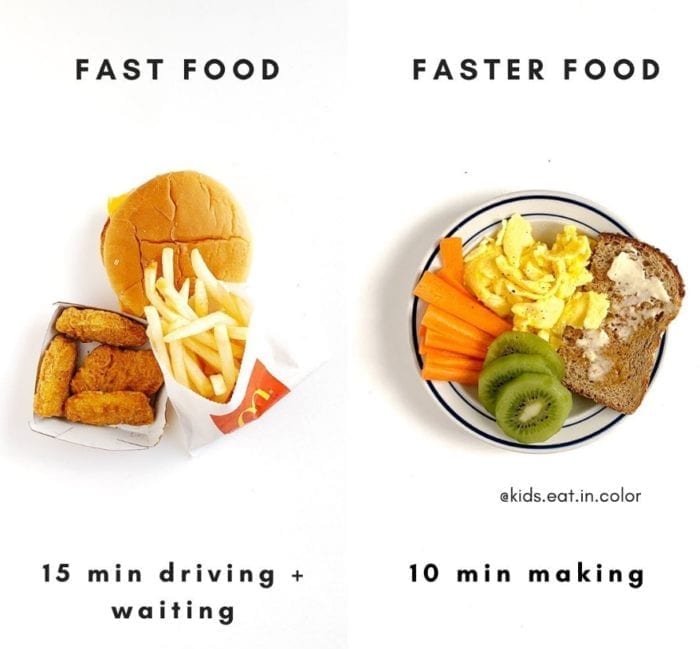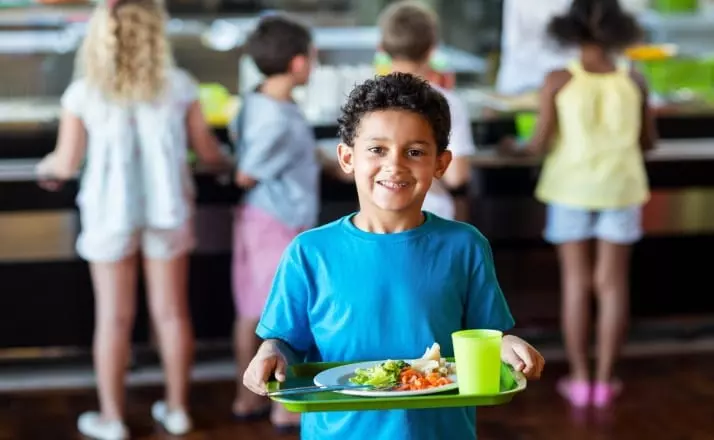School lunches typically get a bad rap, but personally, I think they’ve come a long way since back when I was in school. And yes, this is one of those, “back in MY day” sort of proclamations, but I sincerely believe it to be true.
I remember our junior high lunches consisting of grey slabs of chalky meatloaf, soggy carrots, and cardboard pizza. Sure they installed a salad bar in the high school cafeteria a few years later, but let’s just say that healthy, appetizing food didn’t seem to be a priority.
When I look at the options offered at MY kids’ school, however, I’m blown away by how far things have come.
In addition to the usual cafeteria fare, they also offer kids a full salad bar, a sandwich/wraps bar, and all sorts of healthy variety. What the WHAT??
Are school lunches perfect? Of course not. But when there’s a lot of outside chatter about how supposedly “awful” they are, these criticisms are also heard by impressionable young students.
A registered nutritionist has written an Instagram post urging parents not to tell children that school lunches are “bad” or “unhealthy” and her reasons might surprise you.
Jennifer Anderson is not just a mother of school-aged children, but a food professional if you will. She holds a Master Of Science in Public Health degree (MSPH) and is a Registered Dietician Nutritionist.
Jennifer’s career is based on promoting “colorful” eating for children. Her Instagram account is full of visuals of how to encourage eating a variety of color from the various food groups- even for the pickiest of children.

But Jennifer had become concerned about the constant criticism of school lunches automatically labeled “bad” or “unhealthy”.
Her reason: the supposed poor reputation of the food quality has been deterring children from eating school lunches- even those whose school lunch might be their ONLY meal of the day.
Jennifer posted her concerns about it on Instagram.
She points out that although school lunches certainly aren’t perfect, there are three important things to remember:
1 in 7 kids in the US is food insecure, meaning they may have to be hungry.
For most of us, we take an adequate supply of food for granted. Many have the option to pack healthier lunches for their children, but there are those struggling to the point where they cannot provide ANY form of lunch for their child.
school lunches protect MILLIONS of children’s brains and bodies from hunger, so that they can learn.
Ever try to concentrate on something important while you’re hungry? It’s a recipe -pun intended- for disaster. Now try to imagine a child struggling to focus on third-grade math when he or she has literally eaten nothing all day.
It may seem hard to believe, but it happens. More than you might think.
school nutrition standards are not perfect, but they are good. no one should feel guilty using them.
While the standards of your average elementary school cafeteria might not match those of your own kitchen, most districts make solid attempts to provide nutritious options for their students.
The danger of labeling school lunches as “bad”, or referring to free lunch programs as “for poor kids” is that many of the children who need the meal most often skip their lunch rather than face peer judgement.

Most young kids have a desire to fit in with their classmates, and avoid anything that makes them appear to “stand out” for any reason.
If eating the school lunch is deemed only for those who don’t have “good” food from home or are “poor”, kids in need obviously don’t want to risk being singled out in this manner:
And when stigmatized kids skip a school lunch, they miss tons of nutrition that they can’t get later.
It’s heartbreaking that hungry children might skip an available meal that their bodies need because they are afraid of being ridiculed or judged by their peers.
While you may prefer to pack your child’s lunch with what you consider healthy options, Jennifer urges her followers to take care with the message that is expressed with the action:
Please, don’t tell your child school lunches are bad, unhealthy, or only for “poor kids.”
My own older teens have often complained about some of the meals served at their school cafeteria. In the past, I simply listened- after all, they were the ones eating the food, right?
But after reflecting on Jennifer’s point, I wonder how many self-conscious high school students skipped lunch after overhearing slams like that.
The potential impact of vocally criticizing school lunches:
One, these statements are false.
And two, you have no idea how one comment from an unhungry child to a child at risk of hunger can cause longterm damage. ?
As Jennifer points out, school lunches are not perfect, and there’s room for improvement in many districts. But whether it’s a district or (larger) national issue, instead of complaining in front of your child, be proactive.
Do SOMETHING:
Join a wellness council, run for office (PTA, local, state, federal), organize parents, or vote for someone who will represent your cause.
Kids are so impressionable, and words matter so much to them at a tender young age.
“Food” For Thought: Let’s empower our kids to accept that not every family eats the same way, and there’s nothing wrong with that.











